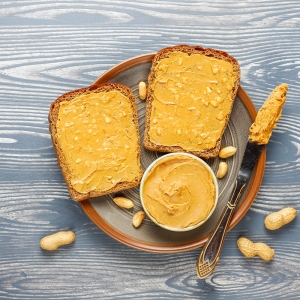The Complete Guide to Peanut Butter and Why it is so PopularPosted by Fitspire on September 23rd, 2022  Peanut butter is a popular food topping or spread in the form of paste. It is made using a rich source of protein~ peanuts. This food spread is used to top up bread and other snacks for breakfast or meals after a workout. Along with roasted peanuts, it may contain certain emulsifiers, salts, and sweeteners. Long back in 1895, the creator of Kellogg’s cereal, Dr. John Harvey Kellogg patented a procedure to make peanut butter. His highlighted motive was to create and promote a different source of protein for people who can’t chew hard foods. Further in 1903, a machine to make peanut butter was patented by Dr. Ambrose Straub. With time, different variants like crunchy peanut butter came into existence. There is no doubt that this protein-rich butter conquered the industry with its taste, texture, and versatility. How is peanut butter made?As the name suggests, peanut butter is made with peanuts. To start the process, peanuts are roasted in a big oven at a temperature of about 430° C. This method is referred to as dry roasting. Once they are roasted, peanuts are transferred to a blower-cooler cylinder. To remove the leftover seed coats, the water or heat blanching process will take place. Finally, peanuts will be ground at least twice in a grinder to get a fine paste. Ingredients like vegetable oil stabilizers, salts, and sugars will be added to the paste to make it homogenous. A 100% Vegan peanut butter contains only plant-based ingredients. It doesn’t have any animal derivatives. Peanut Butter PopularityPeanut butter became prominent as a snack for wealthy people. With time, its accessibility and popularity increased across the globe. The major reasons for this popularity are affordability, nutritional value, and taste. In American culture, peanut butter is one of the pop icons. Indian markets are also being influenced by the benefits it offers. Today, you can find a number of peanut butter brands in India providing varied flavors. Among others, Chocho cookie & Crunchy Chocolate flavors are gaining great consumer attention. Nutritional Value of Peanut ButterDepending upon the nutritional value of peanut butter, its quality varies. Peanut, being the main ingredient, makes it a rich source of protein. Considering some kinds of peanut butter, 2 tablespoon serving provides the following nutrients:
Furthermore, variants like peanut butter with Plant based proteinserve with vegan protein derived from plant sources. It doesn’t contain any animal-based ingredients. You may also find variations like crunchy and creamy peanut butter. In the former, some peanut fragments (coarsely ground) are added for a crunch and better texture. The creamy one, however, comprises vegetable oil or corn syrup for a perfect buttery texture. Peanut Butter BenefitsThe benefits of peanut butter are abundant. As the power ingredient in this food spread is peanuts, it becomes a healthy pick for even gym freaks. People who go through strenuous bodybuilding training can use its calculated quantity. You can even give your kiddo a meal with peanut butter. Other uses are as follows:
Eating too much Peanut ButterEating too much of anything can worsen the health condition. People who eat too much peanut butter frequently may develop intolerance to its ingredients. Eating it in a higher quantity for a long period may also cause a few side effects and allergies. Common side effects
Allergy signs
If your condition worsens with the use of peanut butter or signs of allergy show up, make sure to contact your doctor right away. Which peanut butter is better?Peanut butter is available in the market in a variety of forms and flavors. To know which is better for overall health, it is vital to review the ingredients. Some kinds of peanut butter include vegetable oils and emulsifiers. These are the ingredients that help maintain a creamy texture. The second thing to look for in peanut butter is the nutritional value of the product. A formulation composed of more protein content and dietary fibers can be effective and preferable. Thus, choose the product that satisfies your nutritional requirements and flavor cravings. Note: Consuming too much of it for a longer time may lead to severe complications. It is important to contact a nutritionist or health practitioner in case you’re unsure about its use. Don’t consider this article as a substitute for your doctor’s advice. Like it? Share it!More by this author |


